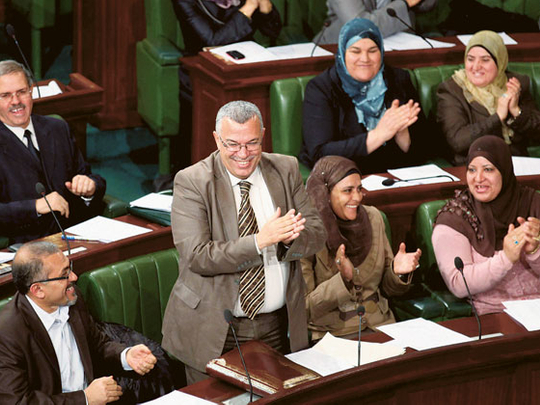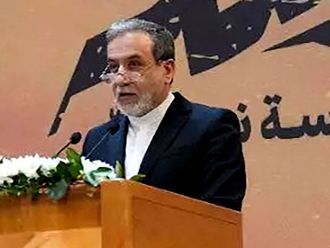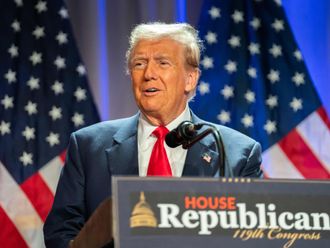
Tunis: "I have to go interact with them for a few minutes," remarks No'man Fehri, a newly elected member of the Tunisian parliament. We're standing outside the parliament building watching a knot of demonstrators on the other side of an iron gate.
Fehri is earnest and passionate, a former London-based management consultant, he rushed home to help build a democracy in his native Tunisia when the Jasmine Revolution broke out last winter.
Fehri is showing me around the Bardo Palace, where the new legislature meets. "God bless your parents," he says, half hugging a workman who agrees to switch on the lights in the round chamber where three days earlier an interim constitution was approved — over the protest of Fehri and other members of the small, left-leaning secular opposition.
"It has no expiration date," Fehri says to explain his objections. "And I don't like the way it cedes authority to the prime minister in case of parliamentary deadlock. Too much depends on the goodwill of a few individuals."
Fehri walks down to the front row and slides into a seat. "This is where I sit."
A mixture of bemusement and suppressed pride lights his face. "Al Nahda goes from the end across to there." He indicates a fat wedge of seats held by the religious party, which won a plurality of votes in October's election. Arguments over how to interact with Nahda's governing coalition have racked Fehri's Afeq Tounes party, with adamant feminists rejecting any cooperation whatsoever.
"One good thing about their success is that it transformed the social make-up of the parliament," notes Fehri. "Normally the top positions on electoral lists are held by the elites, the suit-and-tie crowd. But because they did so well, Al Nahda had to reach deep down into its list to fill all its seats. So this parliament, for the first time, truly represents Tunisian society."
Maybe, but post-revolutionary Tunisians aren't leaving anything to chance, and the parliament is under observation by the country's version of the Occupy movement. Outside the fence encircling the Bardo Palace, a few hundred people camp in white tents, angry banners draped across the awnings.
Shaking the hands of two policemen on guard at the gate, he steps out, approaching a woman at the edge of the crowd. Soon there's a rush of people.
"This guy, what does he do?" a young man asks me.
"He's a member of parliament. He's come out to listen to you."
"Baah. They're all from the old ruling party." Still, the boy pushes forward till he's shouting at Fehri, who reaches out to grasp his hand as he reasons with him.
Fehri gives the crowd his Facebook address. The tension eases, like a knot loosening.
Fehri's brand of direct democracy has ruffled some feathers. He's been posting drafts of documents under consideration. "A lot of my colleagues didn't like that. But who cares?"
Then he switches the topic. "Here's a question. When they announce the members of the Cabinet, should we, as the opposition, vote no-confidence as a matter of principle? That's what some of my party wants. But I'm not sure. I don't know if it's right to systematically oppose everything this government does. The people want change; they'll see us as obstructionist. Besides, the government might have some good ideas."
Such considerations _ mundane and fascinating — are the nuts and bolts of democracy. How Tunisia grapples with them will be of enormous significance to a transfigured region.
— Los Angeles Times











